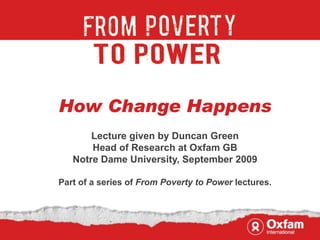
How Change Happens, From Poverty to Power Lecture
- 1. How Change Happens Lecture given by Duncan Green Head of Research at Oxfam GB Notre Dame University, September 2009 Part of a series of From Poverty to Power lectures.
- 2. “There is nothing change permanent except ” Heraclitus 6th Century BC
- 3. A famous example: The abolition of slavery Half a million African slaves 1780 work on the sugar plantations of British colonies British Parliament bans the 1807 slave trade 1838 Slavery banned altogether: 800,000 slaves of the British Empire win their freedom
- 4. Dynamics of Change Waves of slave rebellion in America and Caribbean Haiti becomes first independent black republic in 1804 Individuals and Coalitions The Anglican preacher Thomas Clarkson, MP William Wilberforce, Olaudah Equiano (ex slave). The Quakers build the abolitionist movement – the first modern campaign Britain at war with France, where Napoleon reintroduces slavery and oppose Haiti’s independence; opposing slavery becomes part of war effort.
- 5. Some initial conclusions Many factors combine in any given change Path dependence – one change triggers another Coalitions and alliances (especially insider/outsider) can play crucial role External shocks (eg wars) often catalysts of change
- 6. 4 components of change Context – Technology, environment, demography, globalization Institutions – Culture, ethnicity, religion, attitudes and beliefs – Civil Service, judiciary, electoral democracy, essential services, Agents – Social Movements, elites, political leaders, private sector, media Events – Conflicts, natural disasters, political and economic crises
- 7. Dynamics and pathways Chaotic Cumulative and Sequential Events, tipping points and Path dependence lightbulb moments Demonstration Accumulation of effects forces
- 9. How Change Happens: The Chiquitanos
- 10. How Change Happens: The Chiquitanos 3 July 2007: The Chiquitanos win rights to 1 million hectares of traditional lands in Eastern Bolivia Until 1980 they lived in semi-feudal conditions How did it happen?
- 11. Components of change Context: Economic Crisis in the 1980s, leading to structural adjustment, rising inequality and crisis of legitimacy for traditional parties and trade unions Institutions: rise of indigenous identity; decentralization and agrarian reform Agents: New generation of indigenous leaders; ex-miners arrive in Sta Cruz Events: ‘lightbulb moments’ - breaking into the mayor’s office; marching to La Paz; the election of Evo Morales
- 12. Dynamics of change ‘Historical memory’ of colonialism and repression, but also of the 1952 revolucion Slow legal processes and move into formal politics, but punctuated by political moments and events Importance of alliances with altiplano Indians ‘Water wars’ and the fall of presidents lead to election of Evo Morales 2005
- 13. Is change predictable? Non-linear change = non-elephant animals at the zoo (weather, stock markets, social unrest) Planners v searchers Evolutionary change: differentiate/select/amplify a good model, but works better for markets than society Possible non-linear models of change for ’change agents’: – Solidarity – Venture Capitalism – US Marines (Afghan Solidarity Programme)
- 14. Final thoughts: Some problems with current thinking on change We fail to grasp or respond to the impact of shocks as generators of sudden change Focus on ‘above the waterline’ issues such as policies and laws, at the expense of attitudes, beliefs and relationships Reject (rather than understand/engage with) technology
- 15. Further Reading from the Blog The Global Crisis and technology long waves, www.oxfamblogs.org/fp2p/?p=293 Building women’s leadership: what works?, www.oxfamblogs.org/fp2p/?p=262 What can Economics learn from Evolutionary theory? www.oxfamblogs.org/fp2p/?p=115 Shocks and Change, www.oxfamblogs.org/fp2p/?p=8
- 16. Further Reading From Poverty to Power, Annex on How Change Happens, http://www.oxfam.org/fp2p How Change Happens, Roman Kznaric DFID’s Drivers of Change website, www.gsdrc.org/go/topic-guides/drivers-of-change
